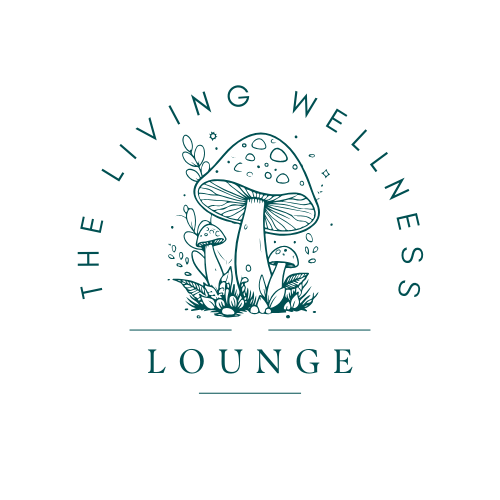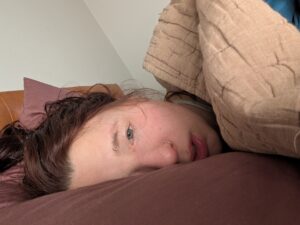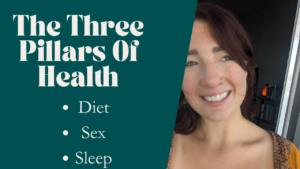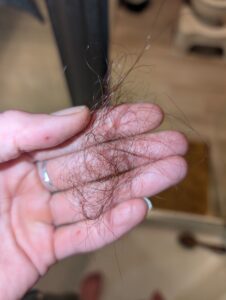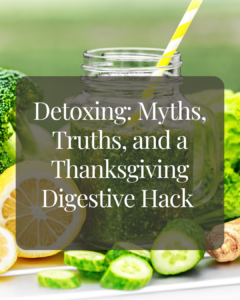Emotion Well Being, Lifestyle Medicine
Why Sleep is the Unsung Hero of Health and Healing
The Irony is not lost on me….
I’ve writing this article while yawning because I stayed up too late!
I can tell you firsthand the impact sleep has on all areas of health. I occasionally let too many late nights creep into my schedule (what can I say, I love a late-night study sesh), and I certainly notice the effects. The next day, I reach for foods I wouldn’t normally choose, my moods are less stable, my light dims, I’m less motivated to work out, and my energy and concentration wane.
Sleep is critical for healing. It’s the time our body uses to rebuild, restore, and remove what is no longer needed. Most healing happens at night while we slumber. If you’re struggling with anything, or even if you’re not, sleep matters. It’s essential for restoring and maintaining balance in the body.
We often think of sleep as a time to recharge, but it’s so much more than that—especially when you’re facing chronic, persistent, or mysterious health issues. Sleep is one of the most powerful tools our bodies have for healing and balance. It’s during sleep that your body does some of its most important work: repairing tissues, balancing hormones, processing emotions, and detoxifying the brain. Yet many of us don’t get enough of it, and the consequences are far-reaching.
In my practice, sleep is a non-negotiable for all of my clients. It’s impossible to address other aspects of health—whether it’s chronic pain, hormonal imbalances, or mental clarity—if we’re not also addressing the quality of your sleep. No matter what symptoms or conditions you’re struggling with, improving sleep is always the first step toward healing.
What Happens When We’re Sleep-Deprived? We’ve all experienced the immediate effects of a bad night’s sleep. You wake up feeling groggy, cranky, and less motivated. But what’s happening inside your body is much more significant.
Here’s a breakdown of what goes wrong when you’re sleep-deprived:
- Increased Hunger: When you don’t get enough sleep, your body craves quick energy, leading you to reach for sugary, high-calorie foods.
- More Opportunities to Eat: Being awake longer means more opportunities to snack, often out of boredom or fatigue, which can lead to overeating.
- Fatigue Reduces Movement: When you’re tired, you’re less likely to move your body, and exercise often feels like an impossible task. Less movement means fewer calories burned and less energy generated.
- Metabolism Disruption: A lack of sleep throws your metabolism off balance, making it harder for your body to process food efficiently. This can lead to weight gain, insulin resistance, and even metabolic disorders like diabetes.
- Cortisol Spikes: Sleep deprivation causes your stress hormone, cortisol, to increase. This makes you feel jittery and anxious, but also lowers your ability to focus and concentrate. Elevated cortisol also leads to more fat storage, particularly around the belly.
All of this makes it harder to feel your best and function optimally. And over time, chronic sleep deprivation can increase your risk of serious health issues like cardiovascular disease, depression, cognitive decline, and more.
The Role of Sleep in Healing Your body does most of its healing while you sleep. It’s a time of repair, restoration, and regeneration. Without quality sleep, even the best health practices—whether that’s nutrition, movement, or herbal remedies—won’t be as effective. Sleep is where the magic happens. It’s when your body heals itself from the inside out.
So, what does good sleep actually look like?
It’s not just about getting a certain number of hours, but about the quality of that sleep. Ideally:
- You fall asleep easily.
- You stay asleep throughout the night or can easily fall back asleep if you wake.
- You wake up feeling refreshed, energized, and ready to take on the day.
There’s no one-size-fits-all number of hours to aim for, as sleep needs vary based on your constitution, lifestyle, and stage of life. Some people thrive on six hours, while others need ten. What’s most important is that you wake up feeling restored.
Everything Sleep Impacts
Sleep impacts every system in your body. When you consistently miss out on quality sleep, these are the areas that suffer:
- Hormone Regulation: Sleep helps balance hormones that regulate your metabolism, appetite, and stress levels. Poor sleep disrupts this balance, leading to weight gain, insulin resistance, and more.
- Immune Function: Your immune system gets a boost during sleep, producing proteins that help combat infection, inflammation, and stress. Without enough sleep, your immune response weakens, making you more susceptible to illness.
- Emotional and Mental Health: Chronic sleep deprivation is linked to anxiety, depression, and impaired cognitive function. Your brain processes emotions and consolidates memories during sleep, making it essential for mental well-being.
- Growth Hormone Production: Deep sleep triggers the release of human growth hormone (HGH), which is vital for tissue repair, muscle growth, and cell regeneration. Without adequate sleep, this process is impaired, leading to slower recovery and premature aging.
- Thyroid Function: The thyroid is sensitive to sleep patterns. Poor sleep can disrupt thyroid hormone production, affecting metabolism, mood, and energy levels.
- Adrenal Health: Sleep deprivation increases cortisol production, putting strain on the adrenal glands. This can lead to adrenal fatigue, making it harder to manage stress and maintain energy.
- Detoxification and Brain Health: During sleep, your brain’s glymphatic system clears out toxins and metabolic waste. A lack of sleep can lead to the buildup of harmful proteins like beta-amyloid, which has been linked to neurodegenerative diseases like Alzheimer’s.
- Gut Health: Poor sleep disrupts your gut microbiome, increasing inflammation and affecting digestion. This can contribute to conditions like IBS and other digestive issues.
- Blood Pressure Regulation: Sleep helps regulate blood pressure. Chronic sleep deprivation can increase the risk of high blood pressure, raising your chances of cardiovascular issues.
- Pain Sensitivity: Sleep deprivation lowers your pain threshold, making discomfort harder to manage. Good sleep is crucial for coping with chronic pain.
A Client Story: The Power of Restorative Sleep Let me share a powerful story about one of my clients who was struggling with a major health crisis. He had recently been diagnosed with type 2 diabetes, along with several other complications. His symptoms were overwhelming—profound fatigue, confusion, low moods, depression, lack of appetite, significant blood sugar swings, and slow wound healing. His body and mind were completely out of balance, but no one was addressing the root cause of his day-to-day struggle.
When we first met, one of the biggest issues we noticed was his lack of sleep. He was only able to get a few hours of broken sleep each night. His body was so agitated and dysregulated that he couldn’t relax enough to fall into a state of rest. It was clear that he was exhausted, overwhelmed, and scared.
The very first thing we focused on was improving his sleep. I knew that without addressing this, we couldn’t expect much progress in other areas. We introduced herbal support, using some of my go-to sleep remedies, alongside nutrition and lifestyle modifications to help calm his system and promote restful sleep.
And here’s the thing: this is one of the biggest gaps I see in modern healthcare. It’s one thing to manage a disease, but it’s another to help someone feel good enough to make living truly worthwhile. Unfortunately, his doctors hadn’t addressed his lack of sleep, and no solutions were offered to help him feel better during this difficult time. My client didn’t realize how profoundly his sleep issues were contributing to his other symptoms, and how crucial sleep was to his overall healing journey.
Over the course of a couple of months, we were able to turn things around. He went from a few broken hours of sleep each night to averaging 7-8 hours of restful, uninterrupted sleep. The best part? As his sleep improved, his agitation dissipated, and he began to feel more grounded, stable, and capable of navigating his health challenges. We saw noticeable improvements in his blood sugar levels, energy, and overall vitality.
We worked on many aspects of his health together, but both of us agree—restorative sleep was the pivotal turning point. It gave him the foundation he needed to heal.
5 Tips for Better Sleep
Improving your sleep is one of the most powerful things you can do for your health. Here are five tips to get started:
-
Avoid Stimulating Activities Before Bed
Stay away from mentally or physically stimulating activities an hour before bedtime—studying, working out, or watching exciting shows can interfere with your ability to unwind. Opt for calming activities like reading something soothing or meditating. -
Cherry Love
Tart cherries naturally support the body’s melatonin production, which helps regulate sleep. Try incorporating cherries into your nighttime routine! They’re a simple, natural way to boost your sleep quality. -
Abhyanga – A Nightly Self-Massage with Warm Oil
A nightly self-massage with warm oil is incredibly grounding and nourishing. Sesame oil is a great choice for most people. Pay extra attention to the soles of your feet, wrists, ankles, and shoulders for deep relaxation. -
Expose Yourself to Morning Sunlight
Get outside and expose yourself to natural light first thing in the morning, even if it’s cloudy. This helps regulate your circadian rhythm, setting you up for a better night’s sleep. -
Nightly Brain Dump
Write down your to-do list or anything weighing on your mind before bed. This simple practice helps clear mental clutter, allowing you to drift off more easily.
Bonus Hack: Yoga Nidra If you’re struggling to get the amount of sleep you need or wake up feeling tired, give Yoga Nidra a try. Yoga Nidra is often called “yogic sleep,” and it’s a deeply restorative meditative practice. Even just 10 minutes of Yoga Nidra can feel as rejuvenating as several hours of deep sleep. I use this hack when life gets in the way, and I need a quick reset. You can find many guided Yoga Nidra practices on YouTube
If sleep is one thing you’ve been struggling with I invite you to book a path to relief strategy session with me, where we can explore your unique situation and what a path to peaceful sleep and healing looks like.

Book Your Free Path To Relief Strategy Session
This is a 45-minute session where we will review your current health challenges and dig into your history. I'll share my overall thoughts on what's been going on for you under the hood and a high-level strategy to help you experience relief. If it's a good fit, I'll also share how you can work with me to resolve your health struggles.
Book Here